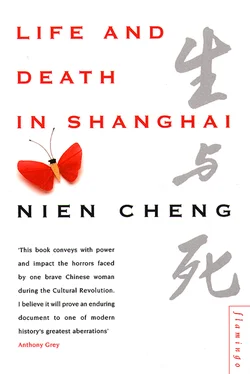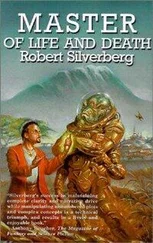When I shook my head again, he declared, ‘You are foolish not to try. In any case, talk it over with Meiping when she comes home.’
(I saw Hsiao Hsu again in Hong Kong in 1980, when I came out of China. He told me that he was turned back at the border when he tried to reach Hong Kong by train. But later, he swam to Macao. A few years later he got to Hong Kong where he worked hard and saved money. In 1980 he was the part-owner of a toy factory in Kowloon that exports toys to many parts of the world. Since conditions in China had changed for the better after Mao died, he was thinking of making a trip to Shanghai to visit his mother.)
I was in the bathroom when I heard the sound of furious hammering on the front gate again. Halfway down the stairs, I came face to face with a little girl about fifteen years of age. She was dressed in a khaki-coloured uniform with a cap sitting straight on her head. The edge of the cap covered her eyebrows so that her eyes peered from underneath it. Her small waist was gathered in by a wide leather belt with a shiny buckle. In her hand she carried a leather whip.
‘Are you the class enemy of this house? How well fed you look! Your cheeks are smooth and your eyes are bold. You have been fattened by the blood and toil of the peasants and workers. But now things are going to be different! You’ll have to pay for your criminal deeds! Come with me!’ From her accent I knew she was a Red Guard from Peking.
I followed her downstairs. Several boys and girls in similar attire were in the hall by the door of the dining room. She went into the room and I followed her.
‘Kneel down!’ one of the boys shouted. Simultaneously his stick landed on my back. Another boy hit the glass door of the cabinet. It broke. He swung the stick round and hit the back of my knee. The decision of whether or not I should comply with the kneeling order was taken out of my hands. I collapsed on the floor.
‘Where is the cash?’ one of them asked.
‘The Red Guards who were here before took it.’
‘Did they take all of it?’
‘No, they left a few hundred yuan for me to live on.’
‘Where is it?’
‘In a drawer in my desk.’
The boy kicked my leg as he passed me going upstairs with the others. The girl with the whip was left to watch me. She swung her whip in the air back and forth, missing my head by a fraction each time. The others came down again with the drawer and tipped the bank notes onto the dining table. They told me to turn round to face the wall. I could hear them counting the notes.
There was the sound of more people entering the house. I wondered if the front gate had been left open but I heard a man’s voice ordering Lao Chao to call Chen Mah and the cook to the hall. Then he said to someone, ‘Take them upstairs and question them.’
The Red Guards went into the hall and then they all came into the dining room.
‘Here she is,’ someone said.
‘You may go now. We will deal with her ourselves,’ said the same person who had spoken before.
I heard the Red Guards leave the house, hitting the walls and the furniture with their sticks and whips as they went out. They banged the front door so hard that the house shook.
‘Stand up! Come over here!’ the man yelled.
I stood up and turned to face the new intruders. The man who spoke was of medium height, slightly built, wearing a pair of tinted spectacles. There were two other men and a woman in the room. Although they all wore the cotton trousers and ill-fitting shirts and jackets of the working class, they spoke like people of some education. On their armbands were the three Chinese characters for ‘Revolutionaries’.
They all sat down in a half moon facing where I stood. The man said to me, ‘You are the class enemy of this house. You are guilty of conspiring with foreign powers. It’s written on the Big Character Poster on your front gate. Do you deny it?’
‘Of course, I deny it! Who are you anyway? What do you want?’
‘We are the Proletarian Revolutionaries.’
‘Never heard of such a tide,’ I said.
‘You are going to hear a lot about us. We are the Revolutionaries who represent the working class which is the ruling class in China,’ he said with a lift of his chin.
‘Isn’t the working class in China represented by the Chinese Communist Party?’ I asked.
‘Shut up! We don’t have to justify ourselves to you. You are an arrogant class enemy! You have no right to discuss who represents the working class in China. We are responding to Chairman Mao’s call to take part in the Great Proletarian Cultural Revolution. That’s quite good enough,’ said the woman.
‘You are a class enemy and a running dog of the Anglo-American imperialists. You went to an American-endowed university in Peking and then to a British university in London so you were trained from an early age to serve the imperialists,’ the man said.
I remained silent as it seemed pointless to talk to them.
‘Is it because you are ashamed that you do not speak?’ the woman asked me.
‘Why should I be ashamed? Many graduates of Yenching University have become leaders of the Communist Party. To have been a student there doesn’t mean I am a running dog of anybody. The London School of Economics was a left-wing college founded by the Fabian Socialists of Britain. In fact, it was there that I first read the Communist Party Manifesto by Marx and Engels,’ I told her.
‘Ha, ha, ha! What a joke! A class enemy and a running dog of the imperialists has read the Communist Party Manifesto! The next thing you are going to say is you want to join the Communist Party,’ the man with the tinted glasses said sarcastically.
The woman said, ‘Lenin denounced the Fabian Socialists as reformers. They were not true socialists because they did not advocate revolution by violence. Don’t try to ingratiate yourself with us. Your only way out is to come clean.’
‘I’m a law-abiding citizen,’ I declared. ‘I worked for a foreign firm and had no access to government secrets. I do not know any foreign governments and they do not know me.’
Another man said, ‘You do know and are on friendly terms with a number of foreign government officials.’
‘You needn’t get so excited. All the senior staff of foreign firms are spies. You are not the only one,’ joined another man.
‘Why should foreign governments trust us?’ I asked them. ‘What hold have they got over people like us who live in China?’
‘Ah! Nearly all of you have money abroad. You don’t deny you yourself have money abroad,’ the man said.
‘That’s a hold on you. They can confiscate your money,’ added the woman.
‘You don’t understand. Governments abroad cannot interfere with the banks. They cannot confiscate the deposit of anybody,’ I told them.
‘Why do you keep money abroad anyway? Why should an honest Chinese want to keep money abroad?’
‘I make trips to Hong Kong and have to pay for my food and hotel bills when I am there. I’m not allowed to take my Chinese money with me, as you know. There is foreign-exchange control. Each time I went out of China, I was allowed only 5 US dollars. Besides, I have to bring money into China to buy coal and other things from the Overseas Chinese Store,’ I explained. ‘I have some money abroad, but I have a lot more money in Shanghai. I have this house. I have my only child here. She is worth more than anything in the world to me. She is a member of the Communist Youth League. Why should I oppose the Communist Party and the People’s Government?’
‘You would oppose the Communist Party even if your daughter were a Party member. It’s your class instinct,’ the man with the tinted glasses, who seemed to be their leader, said.
Читать дальше












